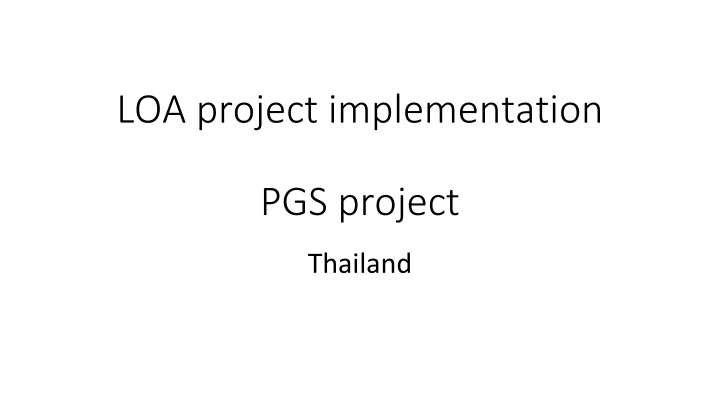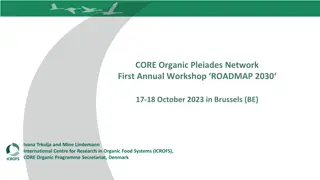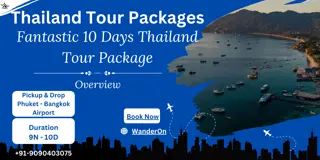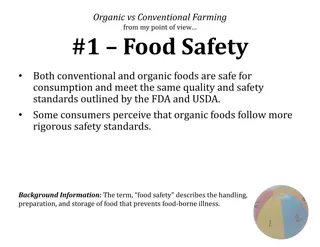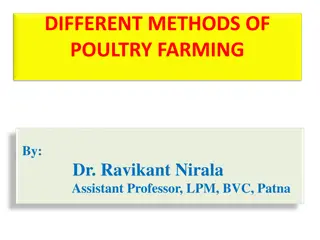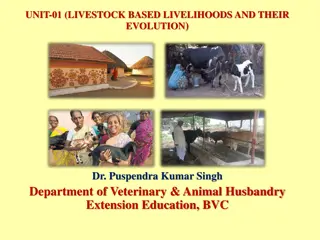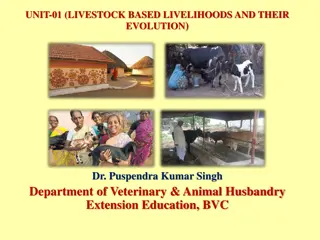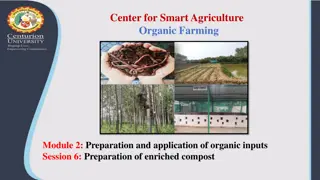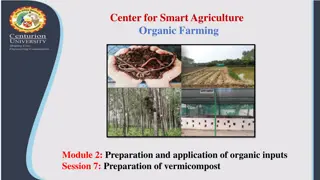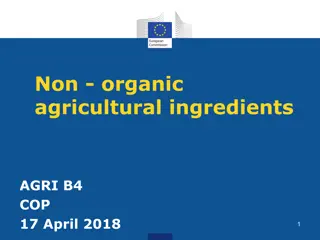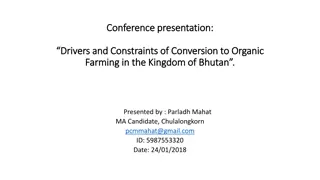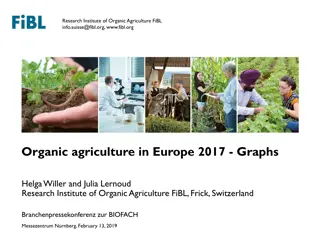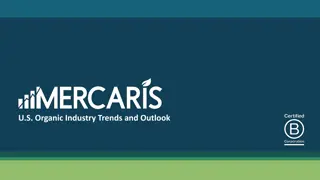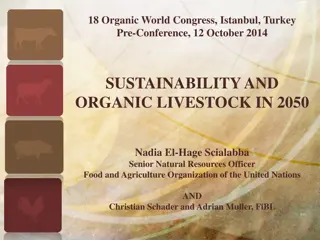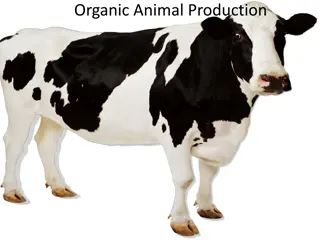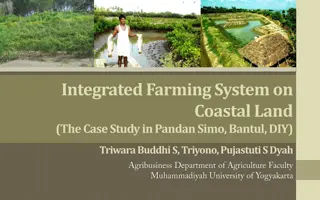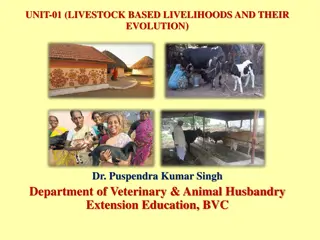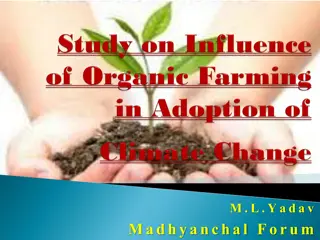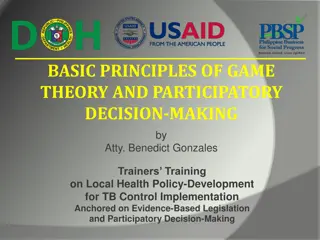Promoting Participatory Guarantee Systems (PGS) for Small Scale Organic Farming in Thailand
The project aims to strengthen organic agriculture communities in Thailand through the establishment of Participatory Guarantee Systems (PGS) as an alternative to third-party certification. PGS advocates for market and government recognition, focusing on quality assurance, trust, and knowledge exchange. Five organic agriculture groups were selected as pilot sites to implement PGS, enhancing compliance with organic standards among small-scale farmers and facilitating access to new markets.
Download Presentation

Please find below an Image/Link to download the presentation.
The content on the website is provided AS IS for your information and personal use only. It may not be sold, licensed, or shared on other websites without obtaining consent from the author.If you encounter any issues during the download, it is possible that the publisher has removed the file from their server.
You are allowed to download the files provided on this website for personal or commercial use, subject to the condition that they are used lawfully. All files are the property of their respective owners.
The content on the website is provided AS IS for your information and personal use only. It may not be sold, licensed, or shared on other websites without obtaining consent from the author.
E N D
Presentation Transcript
LOA project implementation PGS project Thailand
Letter of Agreement ADB and Ministry of Agriculture and Cooperatives, Thailand TA : 8163-REG : Implementing the Greater Mekong Sub- Region Core Agriculture Support Program, Phase II (CASP 2) Duration : 9 April 2015- 31December 2016 : 19 m. Budget : 310,000 $ US 2
Project title: Promoting Participatory Guarantee Systems (PGS) for Small Scale Organic Farming in Thailand Slogan: PGS: Innovation for smallholder market access Contact person(s) Name: Ms. Laksamee Metpranee Organization: Land Development Department Ministry of Agriculture and Cooperatives Email: laksameeming@gmail.com Name: Ms. Jintana Indramangala Organization: Thai Organic Agriculture foundation (TOAF) Email: jintana.indra@gmail.com
Project introduction: Promoting Participatory Guarantee Systems (PGS) for Small Scale Organic Farming in Thailand The project aims at strengthening organic agriculture communities and production chains in Thailand by setting up Participatory Guarantee Systems (PGS) as an alternative and complementary tool to third-party certification within the organic sector and advocates for the recognition of PGS by the market and government. PGS are locally focused quality assurance systems. They can help to assure buyers of product safety and qualities on the basis of active participation of stakeholders. Theyare built on a foundation of trust, social networks and knowledge exchange. Five organic agriculture groups from different locations, employing different production systems, were selected as pilot sites.
Overall Aims: to Enhance Compliance with Organic Standards among Small Scale Farmers Third Party Certification PGS Access to new market Export Market vs. Domestic Market 5
Chiang Mai Coop Chiang Mai province Location of 5 target groups Lumpang herbal group, Lampang province Petchabun organic group, Petchabun province Tubthai group, Surin province google link to four pilot sites that PGS has already been established https://www.google.com/ma ps/d/u/0/viewer?mid=139C0 RIbLh11F8Sg5Hed79GXYkOM &ll=12.897764874990681%2 C108.60955305805226&z=5 Sookjai organic PGS, Nakhon Pathom province 6
Approach and method Select target groups, site visit to meet farmers and assess potential. Provide training: PGS procedure and peer review processes. Follow up and monitor the PGS group. Knowledge management and dissemination. Public relations, joining various major exhibitions and organic trade fairs. Organize open farm sessions for stakeholders. Organize National Forum on PGS for policy advocacy with key stakeholders in public and private sectors Launch TOAF PGS website for online registration, descriotion of the process and data base. PGS scale out to new groups. http://www.ifoam.bio/en/pgs-basics
Results Total Ave. area 1.6 Ha/HH. (10 rais) Production value 100 m.baht 3 m.US $ 456 households 728 hectares (4,550 rais) 8
Impact of PGS movement (n=115) Impact Detail % Production cost Pesticide and chemical fertilizer costs reduced 50 90% Gain premium price Such as water melon from 2 to 20 baht/kg, rice from 8,000 to 14,000 baht/ton 10-1000% Farmer income Gain greater premium prices and access to new market channels Blood chemical residue levels reduced 10-50% Farmer health 78.57 100% Quality food reach Safe food for community increased 100% Farmer response to PGS Number of PGS organic farmer increased 100% Consumer acceptation to PGS products PGS certificate and logo seal gain more consumer confident 100% Other issues Community capacity building, empowerment, sense of democracy, self-reliance and resilience from external circumstance, etc. 100% Thai Organic Agriculture Foundation, www.pgs-organic.org, fb TOAF PGS
Discussion achievements and implications of the work PGS can be regarded as a social innovation that goes beyond a standard safe food certification system. The PGS pilots have contributed to the achievement of SDGs, such as: stabilized household food security, improved farmer health, strengthened local social and cultural conditions, improved agricultural ecosystems, mitigated climate change, increased the sustainable use of natural resources and reduced of poverty. Moreover, PGS hasincreased smallholders capacity to access markets PGS enhances human rights and gender empowerment for female farmer. >50% of the PGS group members and leaders are female. Capacity building for farmers at grass-roots level to become more sustainable and self- sufficient. Innovating in food value chain management, creating direct relationships between producers and consumers and shortening the food supply chain. Corporates/hotels are now sourcing PGS products directly from PGS farmer groups Providing a sustainable platform for collaboration among multiple stakeholders including farmers, government officials, extension workers, the private sector and NGOs.
PGS supported Local food economy Fresh food grown on nearby farms and sold at farmers market. Reduced transportation Best suited to local production The best organic food is what s grown closest to consumers that reduces food miles and offers a shorter, more transparent, and fairer supply chain for food 11
Impact of PGS project to Government Policy & Strategy PGS registered in the 12th National Economic and Social Development Plan (2017-2021). TOAF PGS recognized by the Thai government as part of the organic movement. TOAF PGS as tool of Land Development Department, Queen Sirikit Department of Sericulture and Agricultural Land Reform Office, etc. Strategy map of Yasothon, Ubon Ratchathani, Sisaket, Amnat Charoen and Surin province using TOAF PGS to expand the new PGS groups for organic rice production in the area. TOAF PGS as a tool to expand organic farming to more than 10 provinces.
Technical team: from TOAF/ LDD/ Farmer /University Farm inspection by group of farmers and farmer market manager Farm peer review coached by local University team pictures can be selected and downloaded from: https://www.facebook.com/pg/pgsorganic/photos/?ref=page_internal
